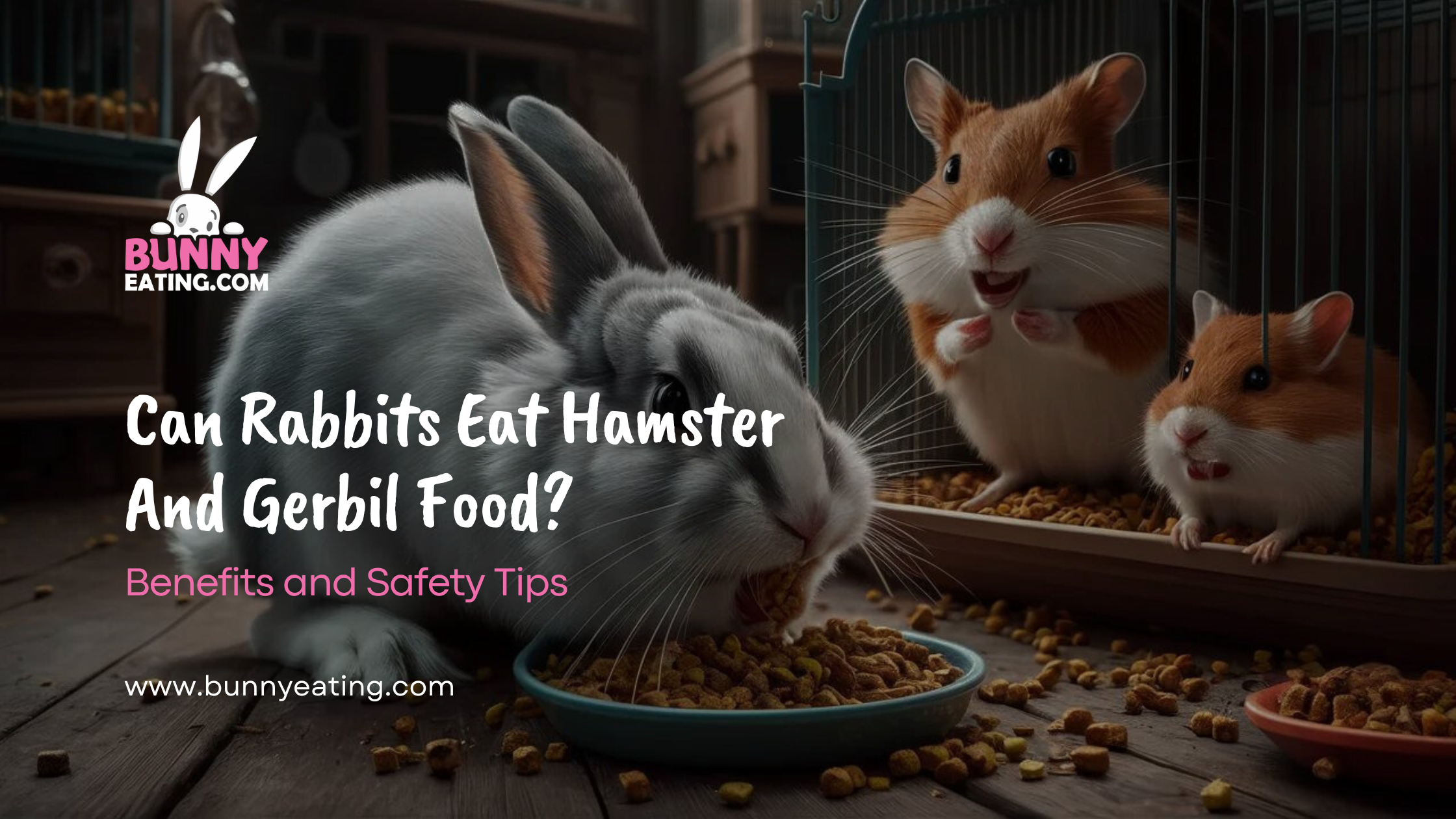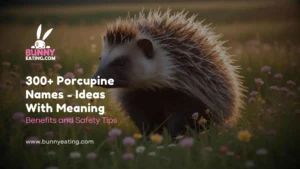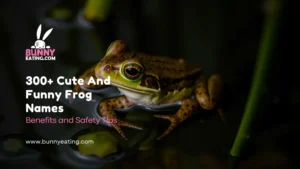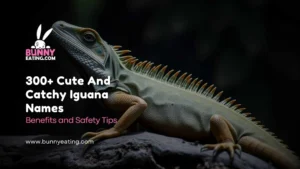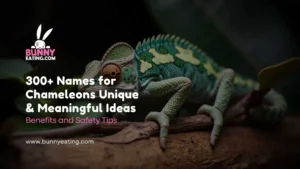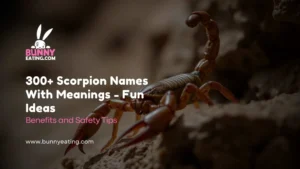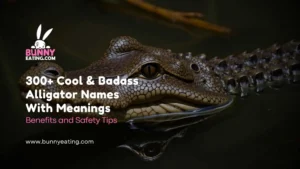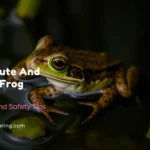Are you thinking of feeding your rabbit, hamster and gerbil foods? Stop right there! For example, feeding hamsters and gerbils food to rabbits is not something that can be considered beneficial or even safe. As you know, there are various feeds available for hamsters and gerbils but these feeds are not suitable for rabbits and may pose some dangers to the pet. Tune in next time to find out how you can feed your rabbit on the right diet to be healthy as well as happy. Can Rabbits Eat Hamster And Gerbil Food?
Safe Alternative to Rabbits Eating Hamster and Gerbil Food
There are some things that you need to know when it comes to your rabbit’s diet, specifically, feeding them with commercial rabbit diets. Rabbit food in this context refers to the appropriate formulation of nutrients that rabbits need to have for improved health. A safer replacement for the above foods is a highly-rated rabbit pellet with fresh hay coupled with fresh veggies or fruits.
Rabbit pellets are made from timothy hay, which is ideal for their digestive system. Fresh hay, particularly timothy hay, should make up the majority of a rabbit’s diet as it promotes healthy digestion and keeps their teeth worn down. Additionally, fresh vegetables such as leafy greens, carrots, and broccoli can be included in their diet for added nutrients and variety.
Table
ToggleRisks of Feeding Hamster and Gerbil Food to Rabbits
Feeding hamsters and gerbil food to rabbits poses several risks. These foods are formulated for the nutritional needs of hamsters and gerbils, not rabbits. As a result, they often contain ingredients that are unsuitable or harmful to rabbits.
For instance, hamster and gerbil food might contain seeds, nuts, and grains, which are too high in fat and sugar for rabbits. Consuming these can lead to obesity, digestive problems, and other health issues. Moreover, these foods lack the necessary fibre content that rabbits need to maintain healthy digestion and prevent gastrointestinal stasis, a potentially life-threatening condition.
Effects of Eating Hamster and Gerbil Food on Rabbits
When rabbits feed on food meant for hamsters and gerbils, they are bound to undergo several bad effects. The nutritional value provided by high-fat and high-sugar foods causes obesity and associated diseases, such as liver disease and joint diseases. Furthermore, an inadequate dietary fibre intake can hurt their bowel movement leading to some of the complications such as reduced appetite and lethargy.
Long-term consumption of inappropriate food can weaken a rabbit’s immune system, making them more susceptible to illnesses. The imbalance in nutrients can also affect their dental health, as they require a diet that helps wear down their continuously growing teeth.
Are Hamster and Gerbil Food Good for Rabbits?
Hamster and gerbil food is not good for rabbits. These foods do not meet the specific nutritional requirements that rabbits need. Rabbits thrive on a diet high in fibre and low in fat and sugar, which is not what hamster and gerbil food provides. Therefore, it is essential to stick to rabbit-specific food to ensure their health and longevity.
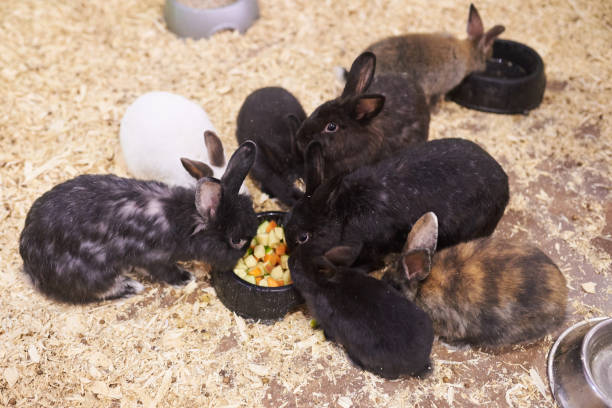
Nutritional Value of Hamster and Gerbil Food for Rabbits
The nutritional value of hamster and gerbil food is not suitable for rabbits. While these foods might contain some beneficial nutrients, they are not balanced in a way that supports a rabbit’s dietary needs. Hamster and gerbil food often lack the high fibre content essential for a rabbit’s digestive health and contain ingredients that are too rich in fats and carbohydrates.
How is Hamster and Gerbil Food Made?
Hamster and gerbil food is typically made from a mix of seeds, grains, nuts, dried fruits, and sometimes pellets. These ingredients are chosen to cater to the omnivorous diet of hamsters and gerbils, which is significantly different from the herbivorous diet of rabbits. The processing of these foods involves blending these ingredients to create a balanced diet for small rodents, but this balance is not suitable for rabbits.
What Types of Hamster and Gerbil Food Are Safe for Rabbits?
Generally, no type of hamster and gerbil food is safe for rabbits. However, if a rabbit accidentally consumes a small amount of plain hamster pellets (without seeds, nuts, or dried fruits), it might not cause immediate harm. Still, it’s not recommended as a regular part of their diet. Always ensure that your rabbit’s primary food is designed specifically for their species.
Do Wild Rabbits Eat Hamster and Gerbil Food?
Wild rabbits do not eat hamsters and gerbil food. In the wild, rabbits feed on a variety of grasses, leafy plants, and sometimes bark and twigs. Their diet is rich in natural fibre and low in fats and sugars, which is what their digestive systems are adapted to. They wouldn’t encounter or consume the processed ingredients found in hamster and gerbil food.
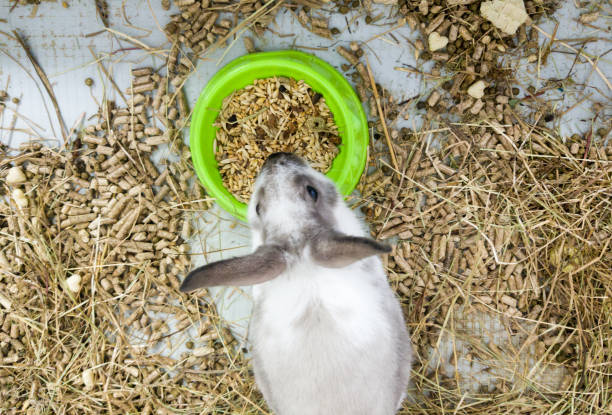
Why is Eating Hamster and Gerbil Food Harmful to Rabbits?
Eating hamster and gerbil food is harmful to rabbits because it does not meet their specific dietary needs. The high fat and sugar content, along with the lack of sufficient dietary fibre, can lead to obesity, digestive issues, and other health problems. These foods can also cause nutritional imbalances, which may weaken the rabbit’s immune system and overall health.
Store-bought Hamster and Gerbil Food and Rabbits
Store-bought hamster and gerbil food should not be given to rabbits. These foods are tailored to the dietary needs of hamsters and gerbils, not rabbits. Always purchase rabbit-specific food that is formulated to provide the right balance of nutrients for your pet.
How Often Can My Rabbit Eat Hamster and Gerbil Food?
Ideally, your rabbit should never eat hamster and gerbil food. If your rabbit accidentally consumes a small amount, it’s usually not a cause for immediate concern, but it should not be a regular part of their diet. Always aim to provide a balanced diet specific to rabbits to maintain their health.
How Many Types of Hamster and Gerbil Food Are There?
There are many types of hamster and gerbil food available on the market, ranging from seed mixes to pelleted diets. Some are designed to be more natural and contain fewer processed ingredients, while others are heavily fortified with vitamins and minerals. Regardless of the type, none are suitable for rabbits.
Observing Your Rabbit After Eating Hamster and Gerbil Food
If your rabbit has consumed hamster and gerbil food by accident, closely observe them for vomiting or changes in their behaviour. Some other signs that you need to watch for include loss of appetite, listlessness and alteration in their stool. If you find any signs that you think are suspicious seek advice from a vet.
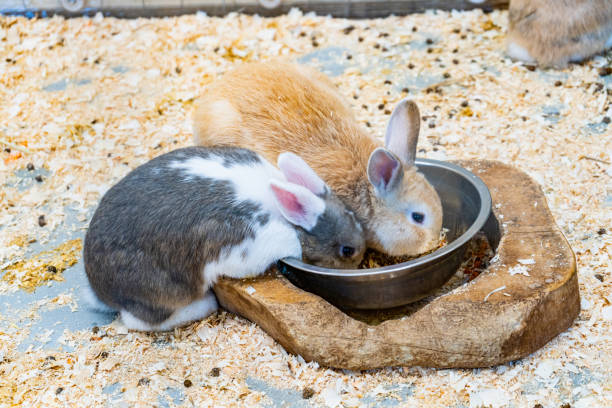
What About Hamster and Gerbil Food Seeds and Leaves?
Seeds and certain dried leaves found in hamster and gerbil food can be particularly harmful to rabbits. Seeds are high in fat and can cause digestive problems, while some dried leaves might be unsuitable or even toxic for rabbits. Always avoid giving your rabbit any food that is not specifically made for them.
Tips for Serving Food to Bunnies
When feeding your rabbit, ensure their diet consists primarily of fresh hay, rabbit pellets, and fresh vegetables. Introduce new foods gradually to prevent digestive upset, and always provide fresh water. Monitor your rabbit’s health and behaviour to ensure they are thriving on their diet.
How Does Digestion of Hamster and Gerbil Food Work in Rabbits?
Rabbits have a unique digestive system that relies heavily on a diet rich in dietary fibre. Hamster and gerbil food lacks this crucial component, which can disrupt the digestive process and lead to health issues. Foods high in fats and sugars are not easily processed by rabbits, leading to potential digestive blockages and imbalances.
Nutritional Benefits of Hamster and Gerbil Food for Rabbits
There are no significant nutritional benefits of hamster and gerbil food for rabbits. These foods are not formulated to meet the specific needs of rabbits and can lead to nutritional imbalances and health issues. Stick to rabbit-specific food to ensure your pet gets the nutrients they need.
What Parts of Hamster and Gerbil Food Can Rabbits Eat?
Ideally, no parts of hamster and gerbil food should be fed to rabbits. While plain pellets without seeds and nuts might not cause immediate harm, they do not provide the balanced nutrition that rabbits require. Always choose food specifically designed for rabbits.
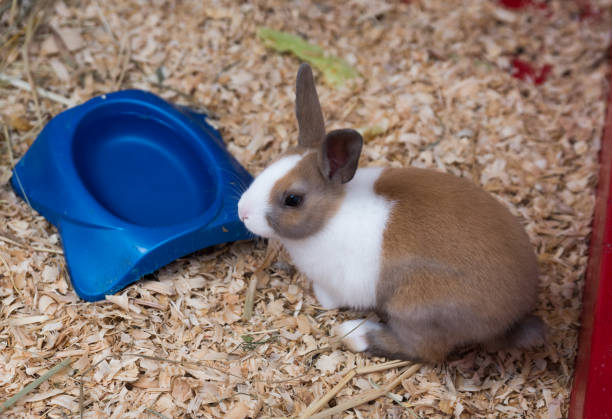
Can Rabbits Eat Hamster and Gerbil Food Seeds?
Rabbits should not eat seeds found in hamster and gerbil food. Seeds are high in fat and can cause digestive problems and obesity in rabbits. Stick to a diet rich in fresh hay, vegetables, and rabbit-specific pellets to keep your rabbit healthy.
Can Hamster and Gerbil Food Be Toxic to Rabbits?
Certain ingredients in hamster and gerbil food can be toxic to rabbits. For example, some foods contain dried fruits or specific seeds that are harmful to rabbits. Always avoid giving your rabbit food that is not specifically designed for their dietary needs.
Can Hamster and Gerbil Food Cause Digestive Problems in Rabbits?
Yes, hamster and gerbil food can cause digestive problems in rabbits. The lack of adequate fibre and the presence of high-fat and high-sugar ingredients can lead to digestive blockages and other health issues. Always ensure your rabbit’s diet is rich in fibre and low in fats and sugars.
How to Introduce Your Bunny to Fresh Foods
When introducing your rabbit to fresh foods, start slowly. Introduce one new vegetable at a time in small quantities and monitor your rabbit’s reaction. This helps prevent digestive upset and allows you to identify any foods that may cause problems. Gradually increase the variety and amount of fresh foods over time.
Rabbit Safe Chewing Materials Include
Rabbits require safe chews to maintain their teeth strong and healthy. Feed them items such as untreated wood, hay cubes, and cardboard. Do not provide them with items that have paint, glue or any other powerfully toxic substance. Some of the safe chewing items will reduce dental issues and entertain the rabbits.

Preparing Hamster and Gerbil Food for Rabbits
You should not prepare hamster and gerbil food for rabbits, as these foods are not suitable for their diet. Focus on providing fresh hay, rabbit pellets, and vegetables to meet their nutritional needs.
How Do Rabbits Eat Hamster and Gerbil Food?
Rabbits should not eat hamsters and gerbil food. If they do, they may experience digestive issues due to the inappropriate nutritional balance. Always ensure that your rabbit has access to food designed specifically for them.
What Happens if Rabbits Eat Too Much Hamster and Gerbil Food?
If rabbits eat too much hamster and gerbil food, they may experience obesity, digestive problems, and other health issues. The high-fat and high-sugar content in hamster and gerbil food can lead to weight gain, which can put a strain on their joints and organs. Additionally, the lack of sufficient fibre can cause gastrointestinal stasis, a condition where the digestive system slows down or stops working altogether, leading to discomfort and potentially life-threatening complications.
What If My Rabbit Eats a Large Amount of Hamster and Gerbil Food?
If your rabbit consumes a large amount of hamster and gerbil food, monitor them closely for any signs of digestive distress or discomfort. Contact your veterinarian immediately for guidance on how to proceed. It’s essential to address any potential health issues promptly to prevent further complications.
How Much Hamster and Gerbil Food Can My Rabbit Eat?
Ideally, your rabbit should not eat any hamster and gerbil food. Instead, please provide them with a diet consisting of fresh hay, rabbit pellets, and a variety of fresh vegetables. These foods are specifically formulated to meet their nutritional needs and support their overall health.
When Shouldn’t You Feed Hamster and Gerbil Food to Your Rabbit?
You should never feed hamster and gerbil food to your rabbit. These foods are not suitable for their dietary needs and can lead to various health issues. Always choose rabbit-specific food to ensure your pet receives the proper nutrition.
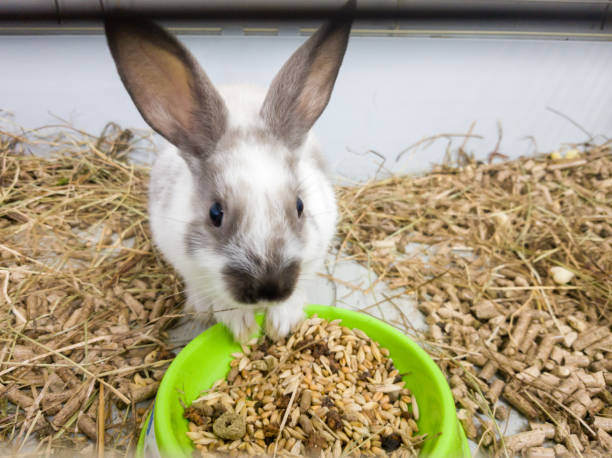
Potential Dangers
Feeding hamsters and gerbils food to rabbits can pose several potential dangers. These include obesity, digestive problems, dental issues, and nutritional imbalances. Additionally, some ingredients in hamster and gerbil food may be toxic to rabbits or cause allergic reactions. It’s essential to prioritize your rabbit’s health by providing them with a diet tailored to their specific needs.
What if My Rabbit Accidentally Eats a Lot of Hamster and Gerbil Food?
If your rabbit accidentally consumes a significant amount of hamster and gerbil food, monitor them closely for any signs of digestive upset or other health issues. Contact your veterinarian for guidance on how to proceed. They may recommend observation at home or a visit to the veterinary clinic, depending on the severity of the situation.
Monitoring Your Rabbit’s Health
Regularly monitor your rabbit’s health by observing their behaviour, appetite, and bathroom habits. Any changes in these areas could indicate underlying health issues that need attention. If you notice anything unusual, consult your veterinarian for advice.
Incorporating Fresh Greens and Vegetables
Fresh greens and vegetables are essential components of a rabbit’s diet. They provide essential nutrients and variety, helping to keep your rabbit healthy and satisfied. Introduce new greens and vegetables gradually to prevent digestive upset, and offer a variety of options to ensure a balanced diet.
What Actions Should I Take if My Rabbit Consumes Hamster and Gerbil Food?
If your rabbit consumes hamster and gerbil food, monitor them closely for any signs of digestive distress or other health issues. Contact your veterinarian for advice on how to proceed. They may recommend monitoring your rabbit at home or scheduling a veterinary exam to assess their health.
Creating a Balanced Diet
A balanced diet is crucial for your rabbit’s health and well-being. Ensure they have access to fresh hay, rabbit pellets, and a variety of fresh vegetables. Limit treats and other high-calorie foods, and always provide fresh water. Consult with your veterinarian for personalized dietary recommendations based on your rabbit’s age, weight, and health status.

Can Rabbits Eat Wild Hamster and Gerbil Food?
Rabbits should not eat wild hamsters and gerbil food. In the wild, rabbits forage for a variety of grasses, herbs, and leafy greens to meet their nutritional needs. Their diet is high in fibre and low in fat and sugar, which is essential for their digestive health and overall well-being.
What Else Can I Feed My Rabbit?
In addition to hay, pellets, and vegetables, you can feed your rabbit small amounts of fruit as an occasional treat. Avoid giving them sugary or acidic fruits in excess, as these can upset their digestive system. Always introduce new foods gradually and monitor your rabbit’s reaction.
How to Create a Rabbit-Friendly Garden
Designing a wonder rabbit habitat can involve using rabbit-safe plants, herbs, vegetables, flowers, and shrubs that the rabbit can safely munch on. Delete chemicals like toxins and pesticides from your garden, and set up paths and boxes where your rabbit can safely play and find cover. Use proper barriers for the garden either through constructing raised beds or putting fences if you are experiencing rabbit intrusion.
Feeding Guidelines and Amount
Follow feeding guidelines provided by your veterinarian or rabbit care resources to determine the appropriate amount of food for your rabbit. Offer unlimited access to fresh hay, a measured amount of pellets, and a variety of fresh vegetables daily. Monitor your rabbit’s weight and adjust their diet as needed to maintain a healthy body condition.
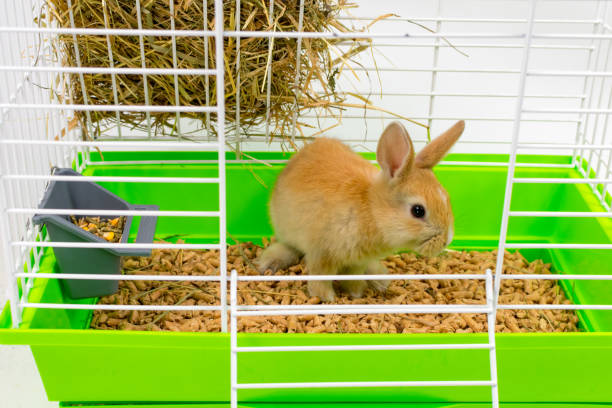
Rabbit Treats Made at Home
You can make homemade treats for your rabbit using rabbit-safe ingredients such as oats, hay, and vegetables. Avoid using ingredients that are high in sugar, salt, or fat, as these can be harmful to your rabbit’s health. Offer treats in moderation as part of a balanced diet.
Conclusion
To sum up, every rabbit needs proper care and using this guide, you can develop a diet which will meet all the requirements of your pet. Nonetheless, using hamster and gerbil food as feed is not desirable as it causes poor health due to its incorrect nutrition ratio. However, it is recommended to feed them a rabbit diet only, fresh hay, and rabbit vegetables for a proper diet for future rabbits. If you monitor the type of food you feed your rabbit, you can ensure that your rabbit enjoys the best health.
FAQs
Can I feed my rabbit hamster and gerbil food?
No, it’s not recommended. Hamster and gerbil food is formulated for the dietary needs of small rodents, not rabbits. Feeding it to your rabbit can lead to health issues due to its inappropriate nutritional balance.
What are the risks of feeding hamsters and gerbil food to rabbits?
Feeding hamsters and gerbil food to rabbits can lead to obesity, digestive problems, dental issues, and nutritional imbalances. Some ingredients may even be toxic to rabbits or cause allergic reactions.
What should I feed my rabbit instead of hamster and gerbil food?
Instead of hamster and gerbil food, provide your rabbit with a diet consisting of fresh hay, rabbit pellets, and a variety of fresh vegetables. These foods are specifically formulated to meet their nutritional needs and support their overall health.
How often should I feed my rabbit?
Offer your rabbit unlimited access to fresh hay, a measured amount of rabbit pellets, and a variety of fresh vegetables daily. Monitor their weight and adjust their diet as needed to maintain a healthy body condition.
What should I do if my rabbit accidentally eats hamster and gerbil food?
If your rabbit consumes hamster and gerbil food, monitor them closely for any signs of digestive distress or other health issues. Contact your veterinarian for advice on how to proceed.
Can rabbits eat wild hamster and gerbil food?
No, rabbits should not eat wild hamsters and gerbil food. In the wild, rabbits forage for a variety of grasses, herbs, and leafy greens to meet their nutritional needs.
How can I create a rabbit-friendly garden?
To create a rabbit-friendly garden, plant various rabbit-safe plants, herbs, and vegetables that they can safely nibble on. Avoid toxic plants and pesticides, and provide shelter and hiding spots for your rabbit to explore.
What homemade treats can I give my rabbit?
You can make homemade treats for your rabbit using rabbit-safe ingredients such as oats, hay, and vegetables. Avoid using ingredients high in sugar, salt, or fat, and offer treats in moderation as part of a balanced diet.
